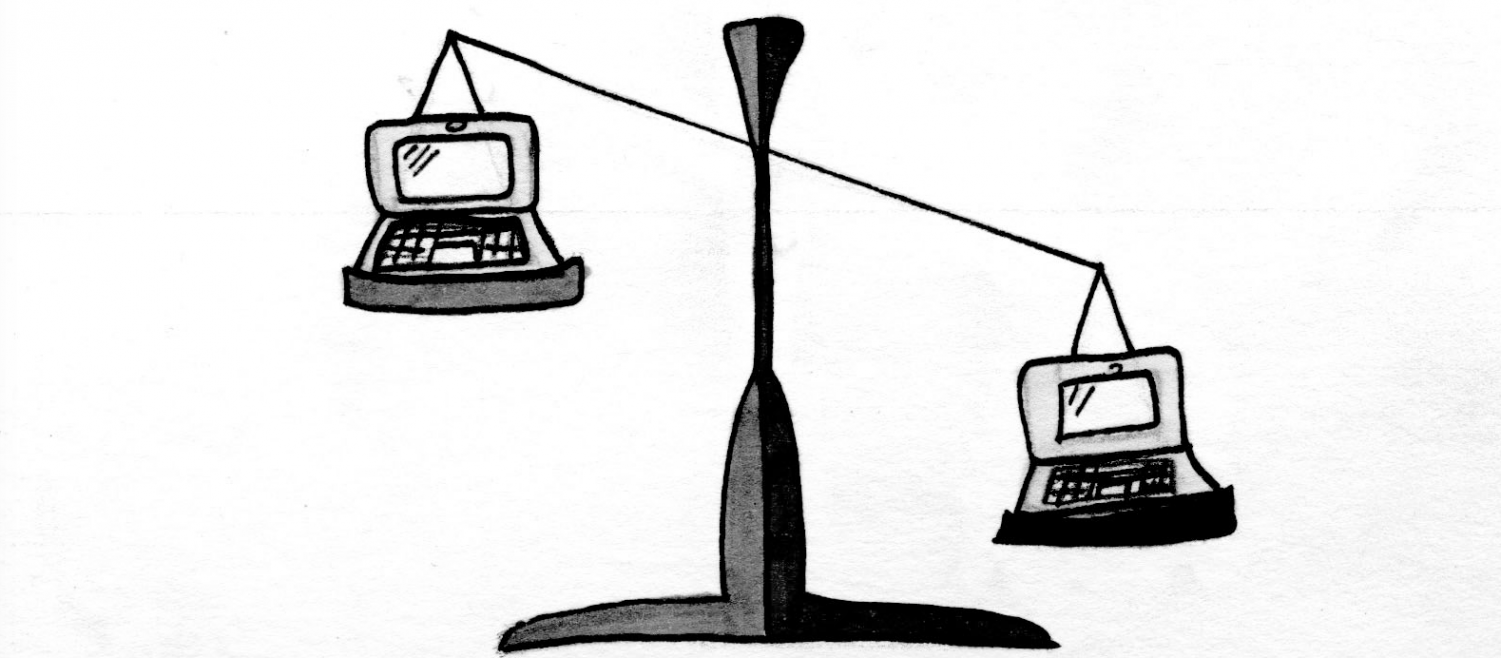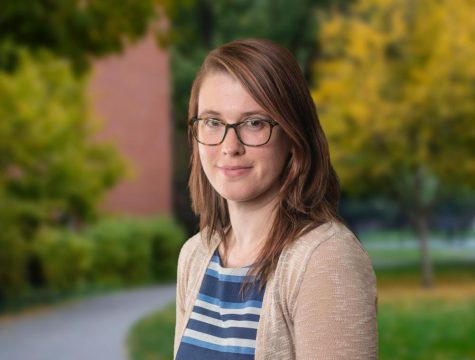Technology in the Classroom
April 25, 2019
As American society continues to rely more heavily on technology year by year, it has become a topic of hot debate whether the use of technology in classrooms enhances or hinders the experience of students and teachers. At Whitman professors take a range of stances: from strict no computer policies to professors who embrace technological tools as ways to help their students learn. To learn more about this divisive topic, we spoke to three members of the Whitman community on their experiences with technology in the classroom.
A Faculty Take on Students’ Use of Technology:
Professor of Political Science Phil Brick, who teaches primarily seminar style classes, allows students to use laptops and tablets in the classroom for educational purposes.
“Students now look at screens more than ever, and also want to save money on printing or paper which is, ironically as an environmentalist, not so much of a concern for me,” said Brick.
Brick explains that in the syllabi for his courses he makes clear that allowing students to read the given material and take notes using technology is conditional — if violated, his policy based on a system of trust with students may change.
“I’m starting to have reservations because I’m not convinced, quite frankly, that students aren’t violating it,” said Brick.
Brick believes in setting a precedence of trust with students, a trust he explains is violated if students are texting or perusing the internet during class.
“My first instinct is to trust students,” said Brick. “I don’t want to infantilize students by saying: ‘No you can’t have this. You won’t be responsible with [technology].’”
While not against students taking notes on computers, Brick identifies a divide the presence of screens in the classroom creates.
“Actually, I don’t see a lot of students taking notes. What I see are students kind of staring at screens,” said Brick. “I know my colleagues have often said we don’t want students hiding behind screens.”
Brick, however, feels increased use of tablets or similar products that lie flat on desks and do not create this barrier may be a solution.
“I think faculty are more comfortable with that because they actually see the text and see the parts that are highlighted,” said Brick.
Student Perspective on Technology in the Classroom:
Shubhra Tewari, a sophomore computer science major, says that she does use her laptop in classes apart from computer science, but sees some benefit when her peers take notes on it.
“They seem to be able to get stuff down a lot faster when the professor’s talking, because I often miss stuff when I’m handwriting,” said Tewari.
Sophomore Sara Dong has felt the disruptive presence of computers in some of her classes, whether through seeing peers text from their computers or online shop.
“It’s kind of eye-catching so you get distracted from the lecture and you may miss something yourself. So it’s more that they’re impacting you and themselves,” said Dong. “I’d rather they put laptops away. They can be very useful but I think people take advantage of the fact that professors can’t see their computers.”
Dong explains that the use of technology for purposes other than what is allowed in a course may stem from a constant desire to multitask.
“We live in this world where you feel the need to multitask all the time and like every second is a wasted second if it’s not interesting. I feel like it’s okay to be a little disconnected and be in the moment in one setting even if it’s not super interesting at that time,” said Dong.
Learning Disability Accommodations and Technology:
Among the variety of circumstances than can play into decisions about technology use in the classroom is the use of technology to accommodate students with learning disabilities.
Antonia Keithahn, Assistant Director of Academic resources and Disability Support Services, explained that technology can be useful in a variety of ways for students with a variety of learning needs. Students with dysgraphia, a condition of impaired handwriting and coherent writing, and students with dyslexia, a difficulty in learning and interpreting letters, words and symbols, can use computers to access notes from peers, type notes, or use tools such as the Notability App to help synthesize information.
“There’s multiple reasons why a particular student might need technology in the classroom specifically related to note taking, because it is a complex process when you start to break it down and think about your getting multiple inputs of information, having to synthesize everything and having some sort of record and there could be various disabilities for which either taking the input of information, synthesizing the information, or recreating it in some format is a barrier and in that way technology is what you can use as an accommodation to kind of bridge that barrier,” Keithahn explained.
In addition to a student using audio and video recording as an accommodation, Keithahn has noticed that more and more faculty members, particularly in STEM fields, are beginning to make video and audio recordings of their lectures available for all students.
“Some faculty members just post their lectures already, so they are providing an audio recording or a video recording with the understanding that either given the way they lecture or the type of material or the demonstrations that their doing that it’s so much more useful to be able to look back on it happening” Keithan said. “Like math faculty, there are a number that I know who do videos of class and its because you want to be able to actually see someone do the math and just an audio recording wouldn’t even provide what you need in that setting. That’s kind of the direction that I think it could be valuable to go in.”
While students with the use of a computer and audio recording are permitted to use this accommodation in all classes, Keithahn said that she and students work together to think about the types of lessons and discussions the use of technology is productive in.
“I do recognize that the kind of topics that are discussed are such that recording may be appropriate in one space and may need to be individual to a student’s accommodation needs in another space. So I do recognize the tension there,” said Keithahn.
She doesn’t believe that this often turns out to be an issue because students are encouraged to be aware and thoughtful about their choices and what the appropriate setting for technology use is.
“It’s just something I encourage students to be thoughtful of and that sometimes faculty will ask me about as well and I’ll say ‘ok while given the structure of your class I think it would be appropriate for this part here, but probably not appropriate for this part here’” Keithahn said. “Just due to people sharing their stories and experiences because we do want to honor that and of course those moments are super valuable in the classroom so if the presence of a technology is hindering that like that’s not a good outcome”
Additionally she emphasizes that she and students work to recognize the appropriate use of recordings and videos of lessons outside of the classroom. Washington is a two-party recording state, meaning that all parties involved in a recording must be aware and consent to such a recording being made. Keithahn said that in the case of recording as an accommodation the consent is implied, however these recordings are intended for academic support only.
“For students who do have lecture recording as an accommodation they do sign a contract that stays here in the ARC (Academic Resource Center) that specifies that the recording is just used for that student’s personal study needs and can’t be disseminated elsewhere, posted online or anything like that,” said Keithahn.
One issue that Keithahn has seen taking place in the classroom is the effects of having a no technology policy on the syllabus can have on students who have a computer accommodation.
“One thing I would want more faculty to be mindful of and definitely been having some tensions with this are stated laptop and computer bans on syllabi. One thing that makes it really awkward is if a student does have a laptop as an accommodation they are being effectively outed and that’s something that I have a little bit of a personal issue with,” Keithahn said.
She says that this outing can be frustrating for those who have to go through it and it is important for professors to keep this in mind while creating syllabi and class plans.
“I had a faculty member over the winter break contact me and said ‘could you look through my roster. Is there anyone that has use of a computer as an accommodation on my roster?’ So I looked through and I said ‘actually there is.’ And so that faculty member said ‘ok well I’m not going to put my electronics policy because I don’t want to out the student and I was like ‘thats awesome. I’m glad you were really thinking ahead in terms of the structure of the classroom not being effectively already feeling like a barrier to access for a student. Where they’re like ‘great now I’m the person here where: are there going to be questions? Am I going to have to justify my needs?’ All of that stuff can be really frustrating, especially when someone has already navigated several years perhaps of trying to get an answer for a diagnosis and then you’re there in a moment trying to re-explain or justify. It gets really tiring I think, especially if thats happening in multiple classrooms like sort of the micro aggressive moments. That might be something that I think it might be useful to have an institutional thoughtfulness towards,” Keithahn said.
Overall she notes that it is always important to be aware of how choices in a classroom setting affect students.
“I think it’s just always important to think about the unintentional impacts that certain choices can have and sort of when designing a classroom experience or a co-curricular experience like trying to come at it from a universal design standpoint of who might be in this space and how can I make it as accessible to as many people as possible. I think that that can include technology as well so just being thoughtful of that.”





